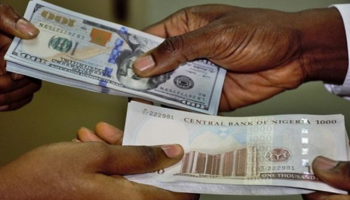Indeed, Naira devaluation is probably the most potent weapon against the prosperity of Nigerians. Nigeria’s migration from a potential industrial powerhouse with bustling social affluence to a subdued and stumbling economy clearly began with the adoption of IMF’s Structural Adjustment Programme during Babangida’s regime: the chorus from International Agencies, at that time, was also that falling oil prices with an unserviced debt burden and the consequent restriction of trade credit to Nigeria were the products of an allegedly overvalued Naira exchange rate.

The Naira appreciated against the dollar on Tuesday, exchanging for N464.50 at the Investors’ and Exporters’ window compared with the N464.51 to the dollar at the close of business on May 26.
The open indicative rate closed at N464.10 to the dollar on Tuesday.
An exchange rate of N467 to the dollar was the highest rate recorded within Tuesday’s trading before it settled at N464.50.
The naira sold for as low as 460 to the dollar within the days of trading. A total of 120.36 million dollars was traded at the official Investors and Exporters window on Tuesday.